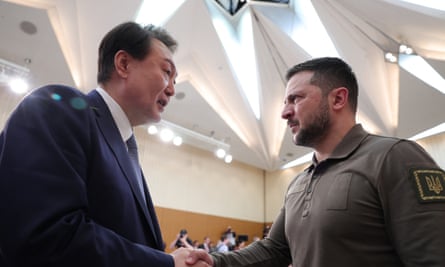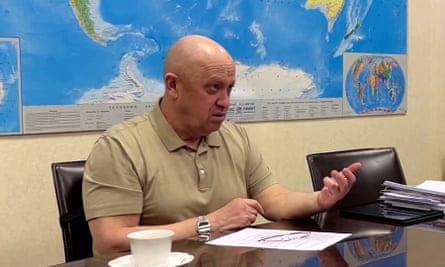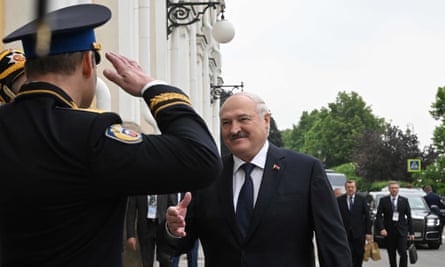Every week we wrap up the must-reads from our coverage of the Ukraine war, from news and features to analysis, visual guides and opinion.
Anti-Putin militias enter the spotlight
As Russian militias opposing the Kremlin readied a daring cross-border raid into the Belgorod region this week, a man with slicked-down hair, in full camouflage and holding an automatic rifle stared into a camera lens, Andrew Roth reports.
That man was Maximillian Andronnikov, the self-proclaimed commander of the Freedom of Russia Legion, a paramilitary group that, until this week, was chided for its outsized internet and media activity.
With the raids into southern Russia this week, the spotlight has been turned on both the Freedom of Russia Legion and the Russian Volunteer Corps, another group composed of Russians who now say they are fighting against Putin.
Jonathan Yerushalmy put together an explainer on Belgorod, the Russian region being drawn into the war.
Zelenskiy steals limelight at G7 in Japan

Normally G7 summits are about battling for the free world comma by comma, Patrick Wintour wrote in his analysis of Zelenskiy’s appearance at the summit, as diplomats parse lengthy communiques of ephemeral significance long into the night.
But the true significance of the Hiroshima summit lay in Volodymyr Zelenskiy’s scene-stealing visit courtesy of a ride in Emmanuel Macron’s French aircraft. The Ukrainian president attempted to win over non-aligned countries such as India and Brazil, not entirely successfully in the case of Brazil.
Zelenskiy did secure fresh military aid from the US during a day of frantic diplomatic activity, Justin McCurry reported, as Russia claimed a battlefield victory in the eastern Ukrainian city of Bakhmut.
Rishi Sunak said after the end of the G7 that a ceasefire in Ukraine would not be enough, Rowena Mason reported, as any end to the war will need to recognise the country’s territorial integrity and include a plan for “just and durable” peace. He said that Zelenskiy’s appearance at the summit had sent an “incredibly powerful” message to Russia.
Wagner chief says 20,000 of its fighters killed in Bakhmut

The head of the Wagner mercenary force has said that 20,000 of its fighters have been killed in the battle for the Ukrainian city of Bakhmut, Julian Borger reported, and warned that Russia could face another revolution if its leadership does not improve its handling of the war.
Yevgeny Prigozhin said 20% of the 50,000 convicts Wagner had recruited, and a similar number of its regular troops, had been killed over several months in the fight for Bakhmut.
Prigozhin pointed to the social disparity underlined by the war, with the sons of the poor being sent back from the front in zinc coffins while the children of the elite “shook their arses” in the sun.
Ukraine rejected Russian claims this week to have captured Bakhmut, insisting its forces still have a foothold in the Donbas city and are steadily encircling the Russian mercenaries holding the ruined town centre.
Russia and China deepen economic ties

Russia and China have agreed to deepen investment in trade services, promote agricultural exports and boost sports cooperation, as Mikhail Mishustin, Russia’s prime minister, signed a set of bilateral agreements on a visit to Beijing.
Mishustin is the highest-ranking Russian official to visit Beijing since the start of the war in Ukraine. In March, China’s leader, Xi Jinping, visited Vladimir Putin in Moscow in a show of support for his “dear friend”.
China has claimed to be a neutral mediator in the war in Ukraine, but China and Russia have pulled closer together since the start of the invasion, Amy Hawkins reported. Ben Bland, the director of the Asia-Pacific programme at Chatham House, said the G7 statements “underlined the deepening geopolitical divide between China and Russia on one side and the US and its allies on the other”.
Russia is moving nuclear warheads to Belarus

The Belarusian leader, Alexander Lukashenko, said that Russia has begun moving tactical nuclear warheads for storage to Belarus, adding that it was possible that the weapons had already arrived in his country.
“We had to prepare storage facilities and the rest over there [in Belarus]. We’ve done all of that. This is why the relocation of nuclear munitions began,” Lukashenko said during a summit of the Eurasian Economic Forum in Moscow.
Asked if the weapons had already arrived, he said: “Maybe. I will go and take a look.”
The remarks came hours after Russian and Belarusian military officials signed a pact that provides for Moscow to deploy tactical nuclear weapons in Belarus, Andrew Roth reports, marking a shift in the Kremlin’s nuclear posture that could raise the stakes of any future instability in Belarus.

